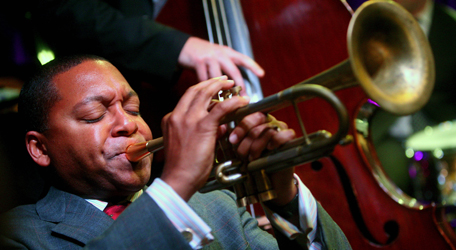Equally accomplished at jazz and classical music, bandleader and trumpeter Wynton Marsalis was the first jazz musician to win the Pulitzer Prize.
Wynton Marsalis’ Early Years
Wynton Marsalis was born on October 18, 1961, in New Orleans, Louisiana. Musical roots run deep in his family; his father is jazz pianist Ellis Marsalis, and three of Wynton’s six brothers, Branford, Jason and Delfeo, are also professional musicians. By the time he was 12 years old, Wynton Marsalis was seriously studying the trumpet, making his professional debut just two years later with the New Orleans Philharmonic. Marsalis played in bands throughout high school; when he was 17, he became the youngest musician to study at Tanglewood’s Berkshire Music Center. At age 18, he began attending the Julliard School in New York City; while there, he also played gigs at local jazz clubs. He eventually attracted the attention of Art Blakey’s Jazz Messengers who invited him to join their group.
In 1980, Marsalis made his first recording with the Jazz Messengers, and in 1981, he recorded and toured with jazz legend Herbie Hancock. That same year, Marsalis signed a deal with Columbia Records and recorded his first jazz album with himself as bandleader. Marsalis’s contract with Columbia was unique in that it called for him to record both jazz and classical albums. “The History of Jazz” asserts that “[Wynton] Marsalis’s rise to fame while barely out of his teens was an unprecedented event in the jazz world. No major jazz figure—not Ellington or Armstrong, Goodman or Gillespie—had become so famous, so fast.”
Sources in this Story
- Wynton Marsalis Official Website: Biography
- The Atlantic: Wynton’s Blues
- Academy of Achievement: Wynton Marsalis
- Jazz at Lincoln Center
- Time: Horns of Plenty
- NPR Talk of the Nation: Wynton Marsalis Moves Jazz to ‘Higher Ground’
Marsalis’ Notable Accomplishments
Finding himself at the top of the jazz world, Wynton Marsalis didn’t waste any time making his mark on musical history. In 1983, he became the first musician to win Grammy Awards for both classical and jazz music in the same year, and in 1984, he won both awards for a second straight year. It was during this time that Marsalis formed his own quintet with his brother, Branford, which lasted until 1985, when Branford left to tour with Sting.
In 1987, Marsalis cofounded Jazz at Lincoln Center in New York. Marsalis became the artistic director in 1992, and the program continues to support jazz performance and education.
During the 1990s, Marsalis recorded several jazz and classical albums, and composed orchestral music and music for ballet and theater.
In 1990, Marsalis appeared on the cover of Time magazine as the new face of jazz music. His reputation continued to grow as he matured as an artist, drawing heavily on the influence of Duke Ellington. The three-disc album “Blood on the Fields,” won Marsalis the Pulitzer Prize for Music in 1997; it was the first jazz recording to win that honor.
The Man and his Work
- “Standards & Ballads”
- “Moving to Higher Ground: How Jazz Can Change Your Life” (book)
- “To a Young Jazz Musician: Letters from the Road” (book)
The Rest of the Story
Marsalis has won nine Grammy awards to date, including six for jazz and two for classical. He is the leader of the Lincoln Center Jazz Orchestra and has made more than 80 records that have sold more than seven million copies worldwide. He has also written a number of books, including one about his relationship with jazz.
In 2015, President Barack Obama honored Marsalis with The National Humanities Medal.
Marsalis played a significant role in fund-raising activities for the Hurricane Katrina relief and reconstruction efforts in New Orleans, as well as devoting time to a number of charitable organizations.
This article was originally written by Caleb March; it was updated October 18, 2017.











